It is my pleasure to welcome author Scott Stavrou to my blog today. Originally from Las Vegas, he lived in San Francisco, Prague, and Venice before settling on a small Greek island. He keeps himself busy writing fiction and non-fiction for numerous publications in America and Europe and was awarded a PEN International Hemingway prize for short fiction. In addition to writing, he serves on the Board of Advisors for Write Away Europe, where he is also a Creative Writing Instructor.
Take a moment to get to know Scott and learn more about his work…
Please tell me a little bit about yourself, your books and writing career.
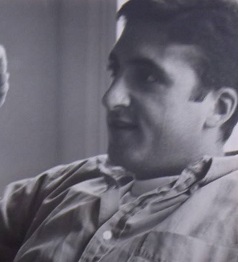 Like my writing, I’m a bit of a mixed bag. I was born in Chicago but then raised in New Orleans, San Diego, and Las Vegas before going to university in Washington, DC. After college I lived and worked slinging words in sundry places including San Francisco, Southern California, Prague, and Venice before moving to the small Greek island my wife Lisa and I now call home.
Like my writing, I’m a bit of a mixed bag. I was born in Chicago but then raised in New Orleans, San Diego, and Las Vegas before going to university in Washington, DC. After college I lived and worked slinging words in sundry places including San Francisco, Southern California, Prague, and Venice before moving to the small Greek island my wife Lisa and I now call home.
Since I first started trying to grow up, I’ve always been a writer, though by necessity and interest (and many missteps), its taken many different forms in many different places. I started out as a copywriter, then some journalism and corporate PR writing before I came to the realization that I didn’t like sitting at a desk and gave in to my wanderlust and did a lot of traveling, which led to travel writing to fund more travels, and then had a travel book published, Wasted Away. For years, I was a columnist and freelance writer and somehow managed to write two screenplays and some sappy TV scripts, and then a satirical stage play before finally committing to my real passion which is novels. So now I sit at a desk again but I get to move it around more and make more things up, which keeps me interested.
My new novel, Losing Venice (Rogue Dog Press, May 2018) came out earlier this year and I’m now at work on my next one.
If you could travel anywhere in the world, where would it be and why?
If I could add “anywhen” to the question, it would be Paris in the 20s to join the Lost Generation. I like being lost — and I like that the beauty of Paris during the trying times between WWI and WWII included so many great writers and artists, Fitzgerald, Hemingway, Stein, Joyce, Orwell, Dali, Picasso, all seeking to find themselves and refine their arts, struggling to be geniuses together. What heady times it would have been to stroll the Left Bank surrounded by such creative genius, to sit in cafes surrounded by such people.
If confined to anywhere today, well, as someone who’s spent most of their years traveling and trying to trod on as much of the earth as possible, I’ve been lucky enough to see most of the many places that I’d dreamed of. So I would hop aboard a slow-moving cargo steamer on an unscheduled trip stopping in unpredicted ports unknown. I still love the exhilaration of setting foot in a new place for the first time and find that some of my favorite travel adventures have come from taking wrong turns or wrong trains to places I never planned on visiting. For me that’s where the magic is, in the exploration of the unknown.
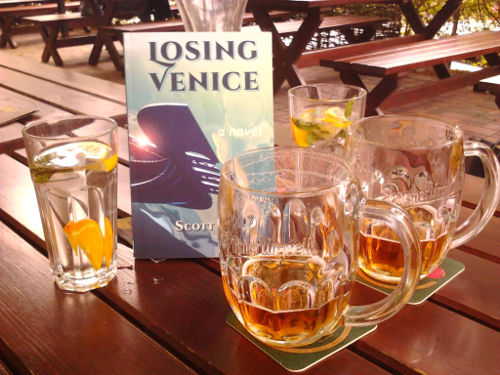
Why do you write the kinds of books you do?
I think all my writing has been an attempt to figure things out, whether a place or an idea. The world is vast and complicated and one of the things I love about writing is the time and focus to explore a place or an idea. To try and understand it and look at it from as many angles as possible.
In an itinerant life of crossing countries and continents, I have loved many places. Just not for long. Because I’ve always moved so much, my life has been defined by getting to know new places and trying to understand them; to get to know them from the inside, to become a part of them. Which led me, rather naturally, first to years of travel writing and globetrotting and then several moves abroad. But of course travel writing demands a factual approach and sometimes you fall in love with places so bountiful that the feeling cannot be wholly constrained by the simple clarity of fact.
Telling what happened is one thing, but fiction writing allows you to try and figure out what it meant; to fully explore the love of the place and the idea of getting to know it and becoming a part of it. And then you set out to craft characters and imbue them with the experience of getting to learn about and love these places and how they struggle with figuring out this thing called life. So hopefully I (and the readers) learn something along the way. Hopefully.
What is your usual writing routine?
Even though I’m always advising my writing students about the importance of routine, it’s more one of the cases of “do as I say, not as I do.” The truth is that I’m just not very good at routine. It’s part of the reason that I’ve written in so many different styles and mediums, from so many different places.
Routine and typical days are anathema to me. I don’t like either. Sometimes I get distracted by the simple pleasures of life and don’t write for a long while and sometimes I write in long impassioned outpourings or with the pressure of almost-missed deadlines. I can’t say I have a typical writing day, nor that I really want one. I follow the serendipity of when I feel something has to be written down right then or risk being lost forever, so I’ve found myself writing most anywhere or any time of day or night. When the need to write is irresistible.
What is the inspiration behind your latest novel?
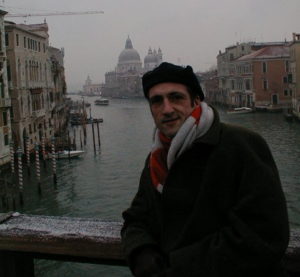 Firstly, Venice itself, both as a place and an idea. With Losing Venice, I was lucky enough to have lived and worked there for a time and it’s one of those places that captures a piece of your heart, that stirs your soul. And because Venice is a place like nowhere else in the world, it’s built to be consumed slowly, by foot or by sea. It’s a place that lends itself to reflections on life, on beauty, and possibility. Not quite dream, not quite reality. A place that everyone has preconceptions of but nevertheless manages to defy them and exceed them. Almost like living in a dream.
Firstly, Venice itself, both as a place and an idea. With Losing Venice, I was lucky enough to have lived and worked there for a time and it’s one of those places that captures a piece of your heart, that stirs your soul. And because Venice is a place like nowhere else in the world, it’s built to be consumed slowly, by foot or by sea. It’s a place that lends itself to reflections on life, on beauty, and possibility. Not quite dream, not quite reality. A place that everyone has preconceptions of but nevertheless manages to defy them and exceed them. Almost like living in a dream.
And while dreams don’t last forever, I like to think that the chasing of them defines life, both in fact and in fiction. Then it’s a matter of coming up with characters and events that start to seem so real that they and their experiences start to nag at you and demand to be told. Then comes the desire to work at writing and making their fictional lives and chasing of their own dreams a tangible and real part of the place. Making them have wants and desires that hopefully have a universal sense of appeal. And exploring their thoughts and experiences in a way that drives a reader to want to know how their experiences and the chasing of their own dreams might turn out. Having characters that are surrounded by beauty but seeking and striving to learn to live beautifully, to make their way in the world and find their own paths.
Why do you write stand-alone novels?
I like books and stories that stand alone. For me part of the crafting of a great story is giving it shape and texture and striving for some sort of theme or comprehensiveness. To find out where a story begins and where it ends, to make it a whole entity, in and of itself. And I just don’t have the dedication to commit to a series or single character. For me, part of the attraction of writing is getting to explore new ideas in new ways and I hope to do that in some manner with future books.
How important is setting to your novel?
To me a captivating setting is part of what makes an interesting book: intriguing characters in inspiring settings and situations. In Losing Venice, Venice of course provides a rich background for the story, but the novel also takes place in Prague and the Greek islands and the locations not only drive the story, the hope is that they become an integral part of the story. Part of the journey of the characters is their interacting with their surroundings and reacting to the discovery of these places.
I think that because I’ve always moved and traveled so much, my life was forged in getting to know new places and the attempt to understand them and get to know them from the inside, to become a part of them. So while Losing Venice is set largely in Venice, the story is also defined by the search for finding a place to belong, a place that fits the characters’ lives and defines them and enriches them, so of of course setting is a vital part of that exploration.
How do you create a realistic setting in your novels?
To me realistic settings are driven by sensory writing. I want readers to not only be able to picture the place but to be able to hear the sounds of canal waters lapping against the crumbling old stones or taste the bittersweet Campari in a spritz or feel like they’re able to sense the unsteady texture of old cobblestoned streets under their feet.
Since the settings of Losing Venice—Venice, Prague, and Greece—are places I love and have lived, the challenge was not one of research but rather to write evocatively enough to make these places come alive in the story and become not just a backdrop but a vivid part of the journey of the characters. Even though I knew these places well, I wanted to depict these real life destinations in a tale of people getting to know and learn about them upon seeing them for the first time, to follow the characters as they uncover the secrets of these locations. For me that’s the real magic of place, that first heart-stopping feeling of emotion that makes you want to know more. Falling in love with it, of being an outsider and attempting to overcome this and get to know the places and the people well enough to become an intrinsic part of them.
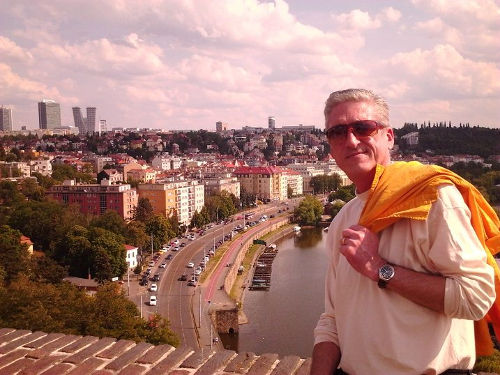
What are you most proud of?
Back when I was a freelance writer before I’d published much fiction, I submitted one of my first short fiction pieces to the PEN America Center and was surprised and honored to have it awarded the PEN International Hemingway Award for Short Fiction. It was not only gratifying because I’d always been a fan of Hemingway’s writing but because the judges had included some of my favorite writers, including Ray Bradbury, George Plimpton, Digby Diehl, Joseph Wambaugh, Bernice Kert, and Barnaby Conrad and I was lucky enough to get to meet them at the ceremony and discuss writing and learn a little from their rich experiences. Getting the award was exciting and inspiring but the real prize was getting to sit and talk with many of my writing idols and learn some lessons from so many masters of the craft. You just kind of hope that maybe some of the mentoring magic might rub off on you.
What are you working on now?
Since the publication of Losing Venice, I’ve written some shorter fiction and non-fiction pieces for a few anthologies, which was a welcome change of pace because Losing Venice was a fairly serious novel that was a long time in the making and it had a lot of literary fiction themes and because I’ve always liked humor writing, there’s also some lighthearted and irreverent humor in it that my editor and I seriously considered editing out. And it surprised and pleased me that most of the reviewers have mentioned that the humorous aspects of the book have been some of their favorite parts.
And because I like that life is sometimes serious and sometimes strange and funny, with that in mind, and because I like to change things up a bit, I’m working on a more comic novel now with some elements of literary satire and some different themes and settings that I hope to have finished and published early next year. I just have to finish putting the words in the right order and learn some more about how strange and funny life is. I’m excited to see how it ends and hope that’s the feeling readers will have when they have it in their hands.
Thanks for stopping by, Scott!
More of his writing can be found at ScottStavrou.com, Facebook, Goodreads, or on Medium (@ScottStavrou) or Twitter (@WriteAwayEurope)
Losing Venice is his second book and is available in paperback and e book in select bookstores and at all your favorite online booksellers, including:
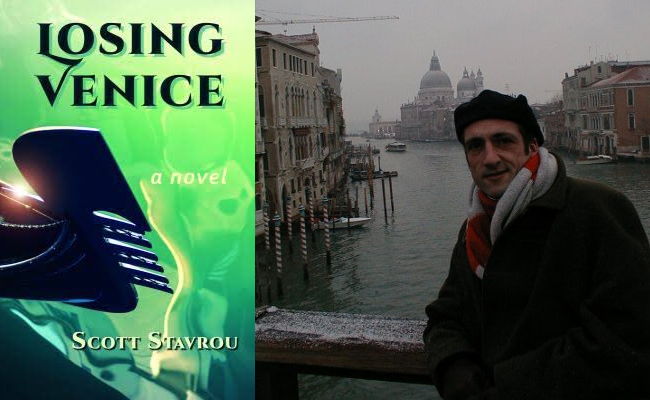

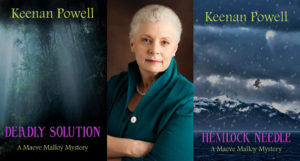
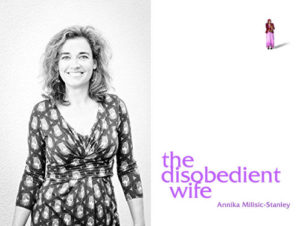
Excellent interview. My compliments!